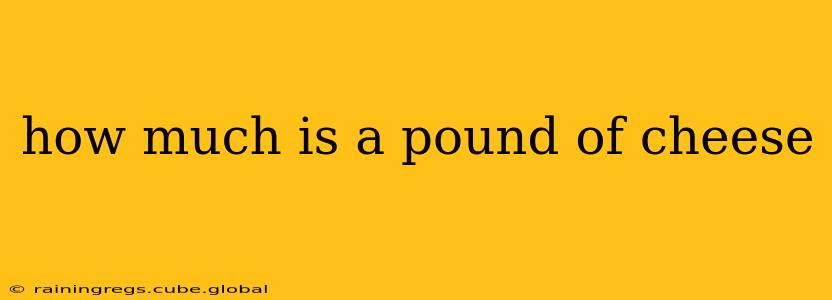How Much is a Pound of Cheese? A Deep Dive into Dairy Pricing
The price of a pound of cheese is surprisingly variable! There's no single answer, as the cost depends on several factors. Understanding these factors will help you navigate the dairy aisle and find the best deals.
What Kind of Cheese?
This is the biggest factor influencing price. A pound of humble cheddar will cost significantly less than a pound of artisanal aged Gruyère or high-end, imported Parmesan. Consider these categories:
-
Everyday Cheeses: Cheddar, Colby, Monterey Jack, and similar cheeses generally fall into a lower price range. You might find these for $5-$10 per pound, depending on the brand and retailer. Store brands often offer the most economical options.
-
Specialty Cheeses: This category encompasses a wide range of cheeses with unique flavors and production methods. Examples include brie, goat cheese, Gouda, and blue cheese. Prices here can range from $10-$25+ per pound, depending on the specific cheese and its age.
-
High-End Cheeses: These are often aged for extended periods, made with specific milk types (like raw milk), or come from renowned producers. Expect to pay $25-$50+ per pound, or even more, for these premium cheeses.
Where Do You Buy It?
Location impacts pricing. A pound of cheese at a local farmers market will likely be more expensive than the same cheese at a large supermarket chain. Smaller, specialty cheese shops also tend to have higher prices, reflecting the expertise and selection they offer. Consider these options:
-
Supermarkets: Offer the widest range of cheeses at generally competitive prices. Look for sales and discounts.
-
Specialty Cheese Shops: Provide curated selections and expert advice, but expect to pay a premium.
-
Farmers Markets: A great place to support local producers, though prices may be higher.
What's the Fat Content?
The fat content (e.g., whole milk, part-skim) can also influence the price. Generally, full-fat cheeses are slightly more expensive than their lower-fat counterparts.
What Time of Year Is It?
Like many agricultural products, cheese prices can fluctuate seasonally. Factors such as milk production and feed costs can influence the overall supply and demand, leading to variations in price.
How can I find the best deals on cheese?
- Check weekly supermarket flyers: Many stores offer rotating deals on cheese.
- Look for store brands: These are often significantly cheaper than name brands and can offer surprisingly good quality.
- Buy in bulk (when appropriate): Larger blocks or wheels of cheese can sometimes offer better value per pound.
- Consider alternative cuts: Shredded cheese is often more expensive per pound than a block.
Is the price of cheese going up?
Cheese prices are influenced by several interconnected factors, including the cost of milk, feed for dairy cows, and transportation. These factors are constantly shifting, resulting in price variations. To stay informed about current market trends, regularly check with consumer price indexes or reliable news sources focusing on food pricing.
By understanding these factors, you can become a more informed cheese buyer, making sure you're getting the best value for your money. Happy cheese hunting!
